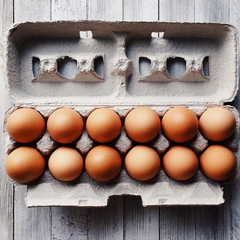Did you know that every year, millions of eggs are thrown away simply because we're unsure if they're still fresh? It's time to crack the code on reducing food waste and ensure that we make the most of our eggs in the kitchen!
In this blog post, we're going to introduce you to the egg float test. It's a simple yet surprising method to check the freshness of your eggs. So, grab a bowl of water and get ready to dive into this egg-citing adventure!
How to test eggs in water
To perform the egg float test, all you need to do is fill a bowl with water deep enough to fully submerge an egg. Then, gently place the egg into the water and watch closely as it finds its place.
If the egg sinks to the bottom and rests horizontally, it is considered extremely fresh and safe to eat. This is because fresh eggs have a small air pocket and denser contents, causing them to sink.
If the egg stands upright on the bottom but tilts slightly, it is still safe to eat but not as fresh. As eggs age, moisture is released through the pore of the eggs and the air pocket inside expands, causing the egg to stand on end.
If the egg floats to the top of the water or is suspended in the middle, it’s time to say goodbye. As eggs deteriorate, the air pocket inside expands significantly, making the egg float.
How to store eggs
Now that you've mastered the art of egg freshness testing, let's move on to storage tips. To keep your eggs at their freshest, always store them in the fridge. For extra freshness, leave them in their original carton to prevent any odours from sneaking in and tampering with their deliciousness.
If you find yourself with an abundance of eggs nearing their expiration date, freezing them is a viable option. Crack those eggs into a bowl, give them a gentle whisk, and pour them into ice cube trays or freezer-safe containers. Don't forget to label them with the date so you know when they'll be ready for their big comeback. When you're ready to use them, simply thaw the frozen eggs overnight in the refrigerator, and they're good to go for your egg-cellent recipes!
Just a friendly reminder: freezing eggs might cause a slight change in texture, but they're still perfectly safe to eat. So, go ahead and whip up some mouth-watering scrambled eggs, fluffy omelettes, or your favourite baked goodies with your frozen egg stash.

Above: Store your eggs in the original carton to avoid odours
And there you have it, folks (or should we say, yolks!). The egg float test is not only a nifty trick to determine egg freshness but also a mighty weapon in our battle against food waste. By giving our eggs a little water adventure, we can significantly reduce waste in our kitchens and ensure that we make the most of every egg we crack.
FAQs
Do you use hot or cold water for the egg float test?
When it comes to the egg float test, it's best to stick with room temperature water from the tap. Cold water might give your eggs a chill, and hot water...well, it might turn your egg float test into a hot mess!
Do fresh eggs float or sink?
Fresh eggs are professional sinkers! They dive straight to the bottom of the water bowl and rest horizontally.
Why do bad eggs float during a float test?
The reason behind this floating phenomenon is the air pocket inside the egg. As eggs age, moisture is released through the pores of the egg and is replaced with more air. This is why an older egg will have a larger air pocket and float to the surface.
Is the egg float test accurate?
Absolutely! It may not give you an exact expiry date, but it will give you a good idea of whether your egg is fresh, still okay to eat but not super fresh, or ready to retire gracefully.
Can you eat an egg that stands up in water?
If your egg decides to strike a pose and stand up in the water, it's still perfectly safe to eat. It's a sign that the egg isn't as fresh as the super sinkers, but it's not yet in the bad egg zone.
